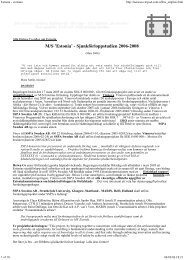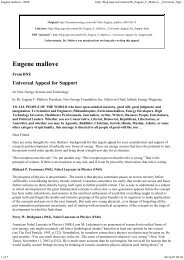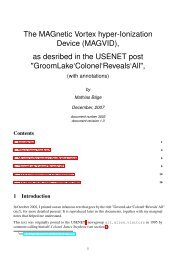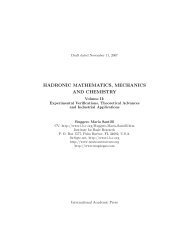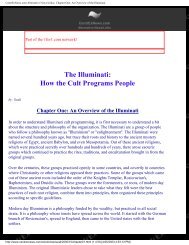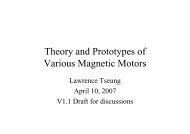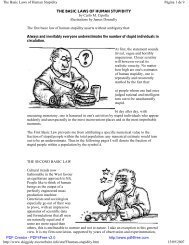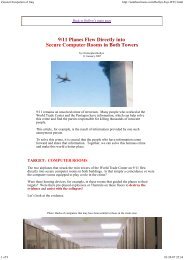You also want an ePaper? Increase the reach of your titles
YUMPU automatically turns print PDFs into web optimized ePapers that Google loves.
<strong>TBR</strong><strong>News</strong>.org http://blog.lege.net/content/TheVoiceOfTheWhiteHouse<strong>2008</strong>08<strong>18</strong>.html<br />
The events in Georgia over the past week have made them rethink that idea. Poland<br />
announced Thursday that it had reached a deal with Washington to base American missile<br />
interceptors on its territory, after months of talks. But then a Russian general went so far as to say<br />
that Poland might draw Russian nuclear retaliation, sending new shudders through the region.<br />
The sense of alarm may be greatest here in Ukraine. Since the Orange Revolution began<br />
in 2004, bringing the pro-Western Viktor A. Yushchenko to power after widespread protests,<br />
Ukraine has been a thorn in Moscow’ s side, though perhaps not as sharp as the outspoken<br />
Georgian president, Mikheil Saakashvili.<br />
“ We’ re next,” said Tanya Mydruk, 22, an office assistant who lives in Kiev, the<br />
capital. “ Sooner or later our president is going to say or do something that goes too far, and then<br />
it will start.”<br />
Ukraine has done little to win Russia’ s favor since the crisis in the Caucasus began. On<br />
Wednesday, Ukraine announced that it would restrict the movements of Russia’ s Black Sea fleet<br />
into Sevastopol, on the Crimean peninsula. On Friday, the Foreign Ministry issued a statement<br />
saying it was prepared to give Western countries access to its missile-warning systems.<br />
“ What happened here in the last week certainly came as a shock, not only to Georgia<br />
but to a lot of others as well,” said Peter Semneby, the European Union’ s special representative<br />
for the South Caucasus. “ A lot of people will, as a result of this, want to build a closer<br />
relationship with their Western partners as quickly as possible.”<br />
Tensions between Russia and Ukraine have been high for years. Mr. Yushchenko, like<br />
Mr. Saakashvili in Georgia, has sought stronger ties with the West, including membership in<br />
NATO, which Russia has said would threaten its security. In early 2006, Russia cut off natural gas<br />
supplies to Ukraine, in a bold maneuver to weaken Mr. Yushchenko’ s government.<br />
Yet despite fears of a Russian resurgence, Ukraine remains deeply tied to Russia by<br />
culture and history. Its ethnic Russian minority, largely in the south and east of the country, is<br />
roughly 17 percent of a total population of 46 million. Many Russian speakers watched the<br />
conflict in Georgia unfold through the prism of state-controlled Russian television channels that<br />
are broadcast here.<br />
A growing nationalist sentiment among other segments of society, along with expanding<br />
trade and cultural ties with the West, has further complicated the political situation.<br />
Asked whether Ukraine’ s future lay with Russia or the European Union, Lena<br />
Stepnevska, 24, who works at a construction company and was out for a walk in the capital on<br />
Friday, opted for Russia. “ I would like to believe it will be Russia, because we are fraternal<br />
nations and have to support each other,” she said.<br />
Though he supports membership in both NATO and the European Union, Anatoliy<br />
Grytsenko, the head of the national security and defense committee in Parliament and a former<br />
defense minister, said Russia could not be ignored. “ Russia will not disappear tomorrow, as well<br />
as in a century or two,” he said. “ We will always wake up and it will be there, not Canada.”<br />
The Baltic states, meanwhile, are gravely concerned about what a newly dominant Russia<br />
could mean for them, even though they became members of NATO in 2004 and therefore have<br />
more protection.<br />
“ In the public, there’ s a certain anxiety,” said the Estonian president, Toomas<br />
Hendrik Ilves. “ Given our history, we understand why people feel anxious.”<br />
While Mr. Ilves said fears that Russia would invade Estonia were unfounded, he<br />
emphasized the serious consequences of Russia’ s actions in Georgia in terms of maintaining<br />
international order. “ The assumption of the post-1991 settlement has been that the old Russia is<br />
in the past — that it is not a country that invades its neighbors,” he said. “ Basically the entire<br />
14 of 24 08/19/08 13:13



